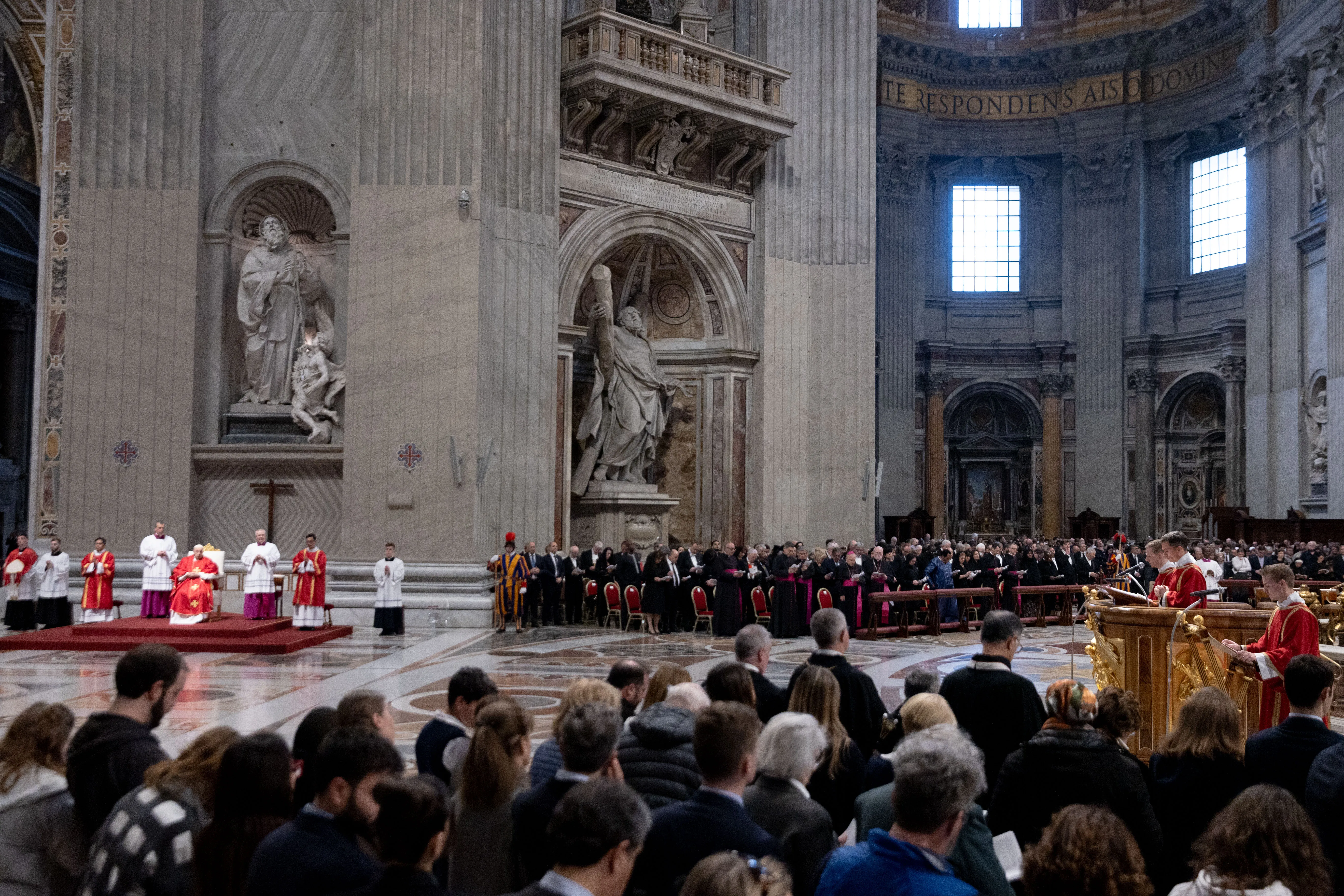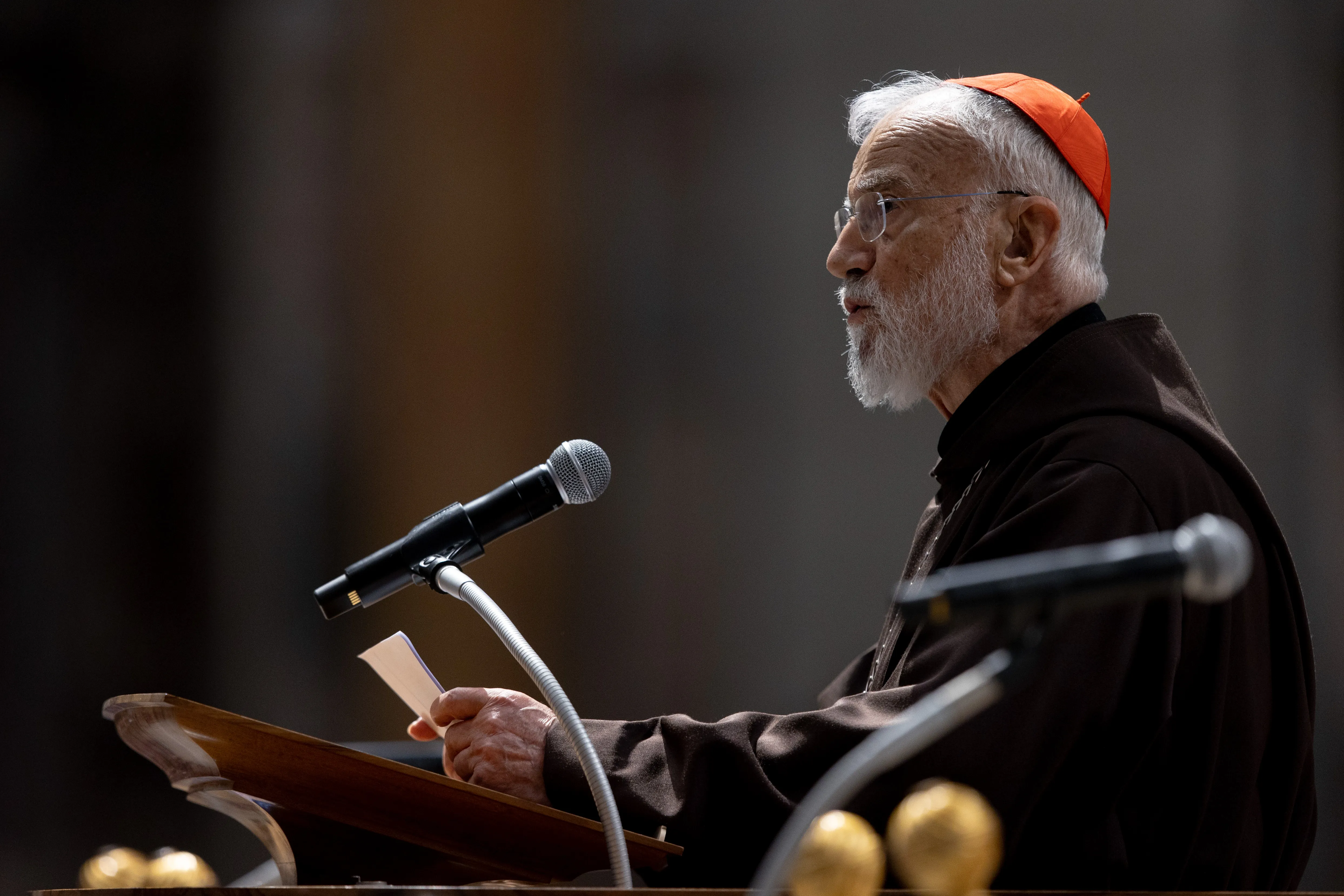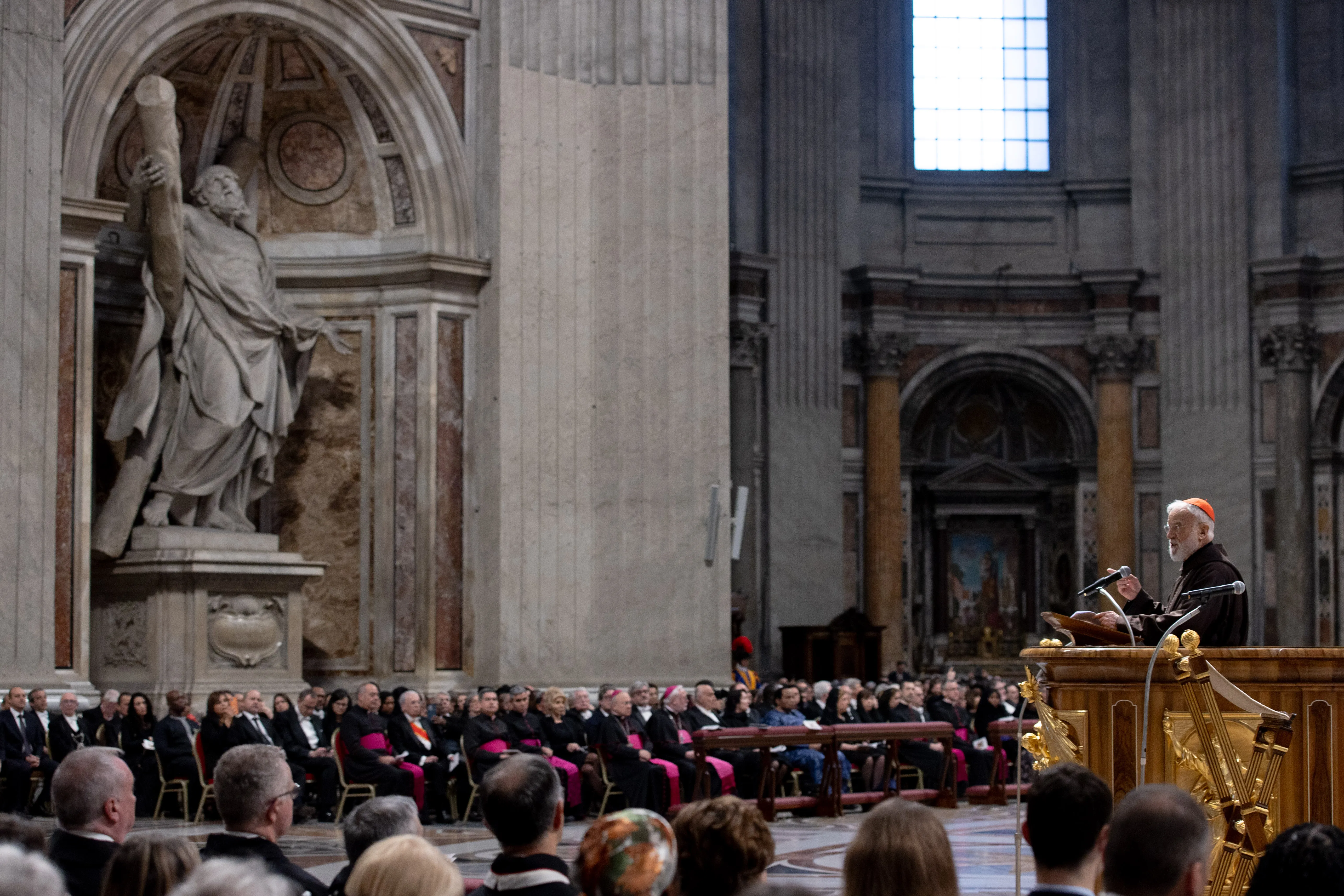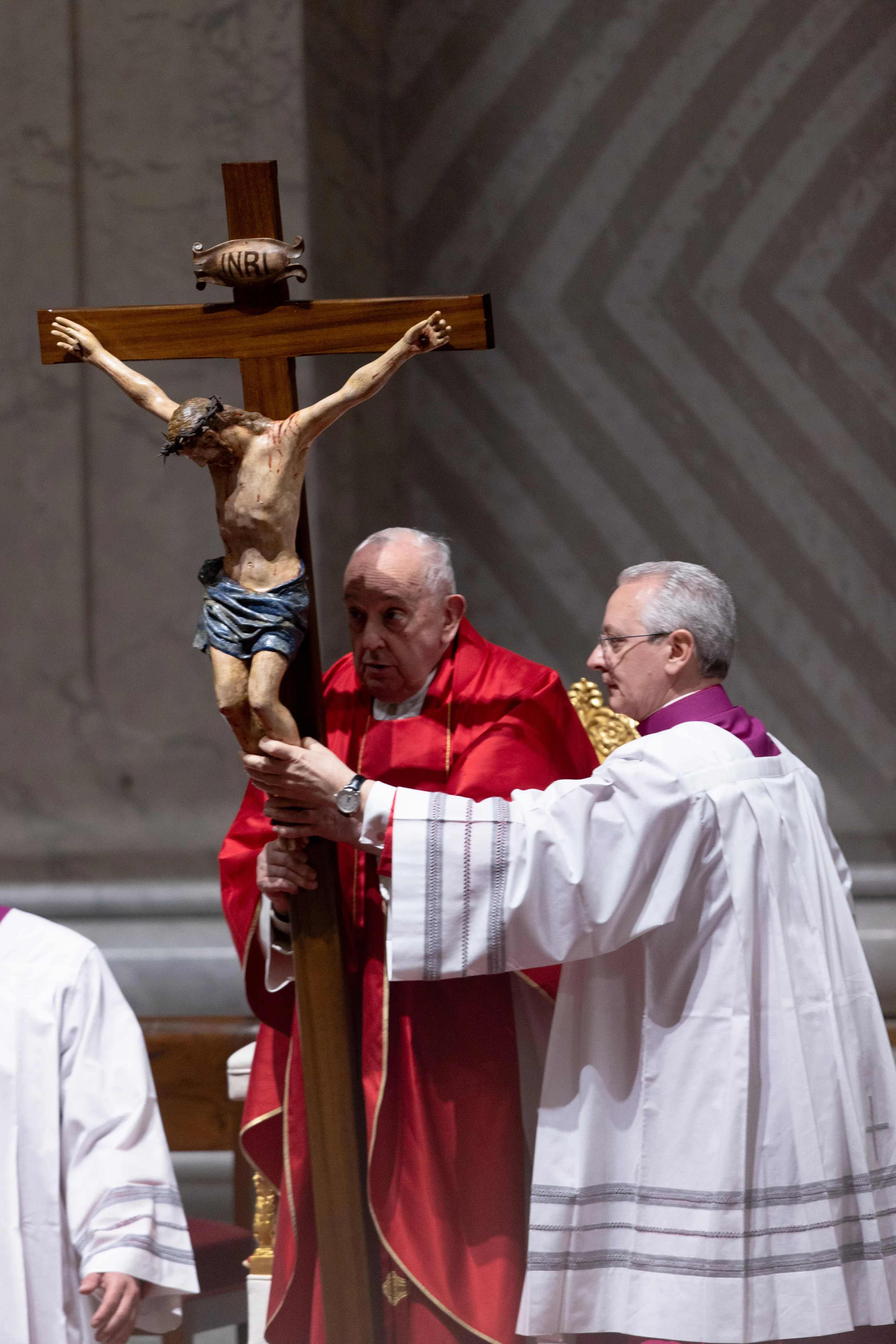
Vatican City, Aug 20, 2023 / 06:12 am (CNA).
Christians should imitate Jesus in being steadfast — not inflexible — in their convictions, thus being open to change for the good of others, Pope Francis said on Sunday.
“This is what God is like: he is love, and the one who loves does not remain rigid,” the pope said on Aug. 20. “You stand firm, you stay firm, not rigid.”
The Christian, he added, “does not remain rigid in his own positions, but allows him or herself to be moved or touched. He or she knows how to change plans. It’s creative love.”
Pope Francis said: “We Christians want to imitate Christ; we are invited to be open to change. How good it would be in our relationships, as well as in our lives of faith, to be docile, to truly pay attention, to soften up for the name of compassion and the good of others…”
The pope addressed a crowd of people from a window overlooking St. Peter’s Square for his usual Sunday address and Angelus prayer on a hot, late August day in Rome.
An estimated 10,000 people were present, according to the Vatican.

Francis’ reflection before the Marian prayer drew on the day’s Gospel reading: The Canaanite woman who asked Jesus to heal her demon-possessed daughter.
Originally, Jesus did not respond to the foreign woman’s request, explaining that he was “sent only to the lost sheep of the house of Israel.”
Francis summarized what happened: The woman asked Jesus “to liberate her daughter, who is tormented by a demon. But the Lord pays no attention to her. She insists, and the disciples advise Jesus to acknowledge her so she might stop. Jesus, however, explains that his mission is directed to the children of Israel, using this image: ‘It is not right to take the children’s bread and throw it to the dogs. And the woman responds, ‘Yes, Lord, yet even the dogs eat the crumbs that fall from their master’s table.’ Then, Jesus says to her, ‘O woman, great is your faith! Be it done for you as you desire.’ And her daughter was healed instantly.”
“We see,” the pope noted, “that Jesus changed his behavior; what made him change it was the strength of the woman’s faith.”
He explained that at the time of the episode in the Gospel, Jesus’ preaching was directed toward the chosen people, while later, “the Holy Spirit would push the Church to the ends of the world.”
Upon witnessing the great faith of the Canaanite woman, however, Jesus anticipates the universality of God’s work, Francis continued. “Faced with her concrete case, he becomes even more sympathetic and compassionate.”

The Canaanite woman, Pope Francis said, probably did not know the laws and religious precepts of the nation of Israel. Her faith, instead, was based on deeds rather than concepts.
And she overcame all the obstacles to speak frankly with Jesus about her need, he added.
“This is the concreteness of faith, which is not a religious label… but is a personal relationship with the Lord,” he underlined. “How many times do we fall into the temptation to confuse the faith with a label?”
“This woman’s faith,” the pope continued, “is not fraught with theological gallantry, but with insistence — she knocks at the door, she knocks, she knocks — it is not done with words, but with prayer. And God does not resist when he is prayed to.”
He encouraged Catholics to ask themselves a few questions, including: “Am I capable of changing opinion? Do I know how to be understanding and compassionate, or do I remain rigid in my position?”
Francis also invited people to reflect on their faith with the following questions: “Do I stop at concepts and words, or is it truly lived with prayer and deeds? Do I know how to dialogue with the Lord? Do I know how to insist with him? Or am I content to recite beautiful formulas?”
After the Angelus, the pope said he was praying for Niger, which is experiencing a political crisis after the military leader General Abdourahamane Tchiani seized power of the country in a coup.
“I am following with concern what is happening in Niger. I join the appeal of the bishops in favor of peace in the country and stability in the Sahel Region,” he said. “Let us pray for the dear people of Niger.”

Francis also greeted those present at the Angelus, including the 29 new students who arrived this week at the Pontifical North American College, a seminary for U.S. seminarians in Rome. He wished them “a good educational journey” as they continue their priestly formation.
If you value the news and views Catholic World Report provides, please consider donating to support our efforts. Your contribution will help us continue to make CWR available to all readers worldwide for free, without a subscription. Thank you for your generosity!
Click here for more information on donating to CWR. Click here to sign up for our newsletter.










And the truth, Pope Francis?
After a decade of this, I have become very open to change.
On the other hand, the dogmatism of change can be the deepest and most rigid rut of all.
Pope Francis, at the age of 86, seems to have a way of affirming one truth while at the same time being no longer supple enough to avoid undermining others. Take, for example, the Canaanite women. Did the incarnate Christ really “change” in any significant way, or instead, under a likely deeper interpretation, did He draw out of the woman a deepening self-understanding of her own faith? And, this demonstration NOT as a change within Christ, but as an instruction toward change in His disciples about finding true faith even within the Gentiles? In another concrete encounter with another woman, because Christ was BOTH truly compassionate and compassionately true, He did not neglect to say, “go and sin no more” (Jn 8:11).
Newman, often misquoted on the meaning of “change,” also understood clearly the confusion caused by switching gears between “opinions” and “change”, and between resilient “truth” and “concrete” situations: “In a higher world it is otherwise, but here below to live is to change [!], and to be perfect is to have changed often. [BUT, the preceding sentences!] “[great ideas, or principles] reappear under new forms. It changes with [controversies] IN ORDER TO REMAIN THE SAME” (“The Development of Christian Doctrine,” Ch. 1, Sec. 1).
I clearly recall that the Holy Father once said “I do not listen to my critics”…It would be well if constructive critics could break through his inner circle—whom, when he asks, assure him that everything is “fine”—such that synodally-attired “tensions” of magisterial depth might at least give the appearance of engaging in real dialogue—in order to remain the same.
Harmonization toward double-speak and a lukewarm middle ground is fatal nonsense. With St. Augustine: “we can say things differently, but we can’t say different things.”
Stopped reading at “rigid”.
Gilberta, you are evidently stuck in a rigidity which is holding on to the old fashioned ten Commandments and Natural Law against which the second bishop in white has laboured hard for ten years.
Only The Spirit of Francis – “the Rupture with the Rupture” or “the Post-post-conciliar Synodal New Way: can help you grow in the Spirit of abandonning Catholicism and embracing “Change”. Otherwise your rigidity is a block to unity with Luciferian Freemasonry in its various shades of Lavender before the end of 2023. Doctrinal Rigidity is a dangerous block to acceptation of Freemasonic Grade 18 Sodomy and Grade 30 Pedophilia. Learn to embrace UN Agenda 30 as your new Ten Commandments, otherwise get ready to be excommunicated by the New Synodal Way for being a Pharisee.
The alternative is to remain stuck in rigid old Catholicism, which blocked the Spirit of Francis for 1,969 years. The choice is rupture or Catholicism. Only the former will draw you into the full communion with the second bishop in white.
Great discernment Cracked Nut! We must insist on this style versus rigid dogma. Stuckedness is so, you know, stuck. If God can change His merciless ways, we should too. The inflexible Perfection of God is such a barrier to progress in the concrete circumstances of life.
Stuckedness and rigidity are forms of disability. Flexibility enhances mobility for onward journey.
This is too perfect for parody. You must be the Pope’s speech writer.
“Flexibility enhances mobility for onward journey.”
It reminds me more of a maxim found in a Chinese fortune cookie.
🙂
No doubt, sin is progressive.
Stuckedness is a new word for me.
🙂
With the upcoming Synod, we’re so stucked.
Thanks Madam Cracker,
Stuckedness and ongoingness are pretty much used concepts in anthropology. One comes across such concepts in the writings of the Lebanese Ghassan Hage and the American Donna Haraway.
“Jesus changed his behavior.” It’s about time! (which is greater than space;)
More meandering nonsense and confusion. Jesus changed His theological outlook and His behavior because of the Canaanite woman? How did Bergoglio ever get through seminary? He is unfit to teach RCIA in the most remote parish of Patagonia.
It is hard to argue with your conclusion. In fairness, however, we should concede that Pope Francis received the best of Jesuit formation.
“He encouraged Catholics to ask themselves a few questions, including: ‘Am I capable of changing opinion? Do I know how to be understanding and compassionate, or do I remain rigid in my position?’”. Now what would that rigid position be? Theological gallantry seems a candidate.
Here His Holiness is making an analogy with Christ’s compassion for the self effacing Canaanite lady begging for her child. Who does not offer theological reasons for her request, rather pleads. However, insofar as this woman, theological gallantry doesn’t quite fit the scenario. Instead, without stretching it one bit we logically draw inference to those who defend a rigid position with theological gallantry. For example, should Christ’s actions change our [rigid] opinion regarding the Holy Eucharist? For those who are themselves quite reluctant to change their opinion?
Finally, isn’t that what Card Hollerich SJ, Fr James Martin SJ, and a host of other Francis disciples contend? Unfortunately there are too many of us who wish to remain theologically gallant.
Whereas the scripture passage is blunt and has a clear context, the exegesis offered by Pope Francis or the ghost writer, is ambiguous and open-ended. The latter does not do justice to the former and comes to no real meaning. There is also the hint of Modernism, in that “change” is central to the Modernist ethic and family of concepts and when it is addressed undefined it takes on a particular meaning. Which is to say that it is wrong to over-generalize scripture on the one hand and on the other hand ignore the realities that surround us in the present that are having their own living impact involving their own nuances. Worse where the only identifiable target, or, point, that the exegesis would appear to be about, is the faithful Catholic. I do not like criticizing the Pope but these types of issues, taken altogether, is, corrections at the level of seminary. Yet at the same time want to come off as something very advanced or wondrous. Where –
1. it was already recommended by the same group that “hermeneutics” needed to be developed around it -suggesting an invitation to revolution;
2. it is offered as an invitation -however, the “non-acceptance” is portrayed as types of rebellion according to a new index, still unfolding, “rigid”, “closed”, “not docile”, “theological gallantry”, “fraught with labels”, “beautiful formulas”, “lacking compassion”, etc.; and
3. run-on sentences and liquid thinking only serve to increase the falsities -but add a masking too.